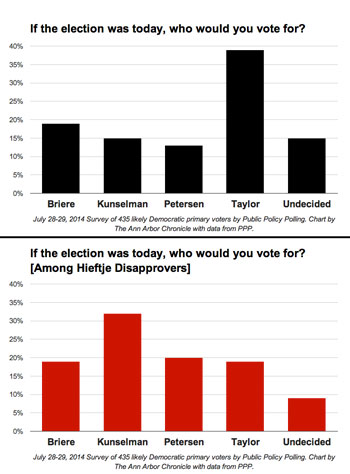Poll: Clear Favorite for Ann Arbor Mayor
From July 28-29, several Ann Arbor residents reported being polled by telephone about their preferences in the upcoming Democratic mayoral primary election. The Chronicle has obtained the results of that poll of 435 likely voters by Public Policy Polling (PPP), a North Carolina polling firm.

July 28-29, 2014 survey of 435 likely Democratic primary voters by Public Policy Polling. Top Chart among all voters: Christopher Taylor (39%); Sabra Briere (19%); Stephen Kunselman (15%); Sally Petersen (13%); Undecided (15%). Bottom Chart (if the election were conducted among those who disapproved of current mayor John Hieftje’s performance): Christopher Taylor (19%); Sabra Briere (19%); Stephen Kunselman (32%); Sally Petersen (20%); Undecided (9%).
They show Ward 3 councilmember Christopher Taylor to be a clear favorite, with about a week to go before the Aug. 5, 2014 primary. Taylor polled at 39% compared to 19% for Ward 1 councilmember Sabra Briere.
Ward 3 councilmember Stephen Kunselman and Ward 2 councilmember Sally Petersen polled a few points behind Briere at 15% and 13% respectively.
The poll indicates that 15% of voters still haven’t made up their minds. Margin of error for the poll is plus or minus 4.7%.
The relatively large four-candidate field is attributable to the fact that no incumbent is in the race.
Kunselman was the first of the four candidates to declare his candidacy – before mayor John Hieftje announced last year he would not be seeking reelection to an eighth two-year term.
The PPP poll also asked respondents if they approved of the job that Hieftje was doing as mayor.
One of the patterns revealed in the analysis of the poll responses is that Kunselman would be a 12-point favorite if the election were held just among those voters who disapproved of Hieftje’s performance. But the poll indicated that only 27% of Ann Arbor voters disapproved of Hieftje’s performance.
A polling question that asked about favorable or unfavorable opinions of candidates – independently of an inclination to vote for them – showed Kunselman polling with the highest unfavorable opinion numbers, at 36%. But the “not sure” category for that question polled fairly high across all candidates, ranging from 29% to 43%.
The poll also included two questions about future growth – one about downtown development, and the other about the need for an improved train station. The poll indicated 46% support for the downtown projects that have been approved and built in recent years and 39% opposition. The need for a new train station polled at 52%, while the alternate view – that the current station is adequate – polled at 35%.
The content of the poll – which evinces some knowledge by its creator of the Ann Arbor political landscape – was not commissioned by The Chronicle or by any of the four mayoral campaigns. Tom Jensen grew up in Ann Arbor and is now director at Public Policy Polling, a firm based in Raleigh, North Carolina. But Jensen still follows Ann Arbor politics. It was Jensen who put the poll together – out of his own interest. And it was Jensen’s voice that was used in the interactive voice response (IVR) technology deployment of the Ann Arbor mayoral poll.
The poll drew as a sample all those who’d participated in any primary election (Democratic or Republican) since 2006. Poll respondents included 32% Republican or other non-Democratic affiliation.
In a telephone interview, Jensen stressed that any poll result should be viewed with a lot of caution, especially with local elections. “I would definitely, as a pollster, encourage people to take caution in over-interpreting one poll of a low-turnout race in the middle of the summer. You’re definitely prone to more error.”
But based on the results of this poll, he said he was 99% confident that Taylor was going to be the next mayor of Ann Arbor.
Additional charts and some additional background on the polling methodology are presented below. [Full Story]



